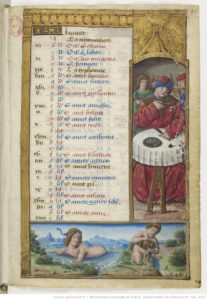
“January”, kalendar page from Les Petites Heures d’Anne de Bretagne (The Little Hours of Queen Anne of Bretagne), by the Maître des Triomphes de Pétrarque. From Bibliothèque nationale de France, Paris (France).
According to the Passio Sancti Sebastiani (“The Passion of Saint Sebastian”), attributed to Saint Ambrose of Milan, Sebastian was also from Milan. He entered the Praetorian Guard under Emperor Carinus, and was promoted to captain in recognition of his bravery. He was responsible for converting a large number of people to Christianity, including a local prefect, Chromatius, who freed all his political prisoners, resigned from his position, and retired to the country. Meanwhile, Carinus was succeeded by Diocletian, who eventually learned that Sebastian was a Christian. Feeling betrayed by a captain in his personal guard, Dicoletian ordered that Sebastian be bound to a stake and killed by Mauritanian archers.
The archers left Sebastian for dead, but when Saint Irene of Rome arrived to retrieve Sebastian’s body and bury it, she discovered that he was still alive. She took him home and, along with her maid, nursed him back to life. Sebastian then confronted Diocletian, waiting on a staircase to harangue the emperor as he passed by. Diocletian was surprised to see Sebastian alive, but recovered enough to orders for Sebastian to be killed again. The soldiers accompanying the emperor seized Sebastian, beat him to death with cudgels (successfully this time), and threw his body into the sewer. A pious lady named Lucinda recovered his body, and brought it to the catacombs to be buried. According to his Legend, Sebastian was buried at the entrance to the cemetery of Calixtus; the site is now occupied by the Basilica of Saint Sebastian.
During the middle ages, people did not understand how the plague spread. The randomness of victims seemed to them to be the result of an angel of death shooting invisible arrows of death at unsuspecting people. Given his recovery from being shot by arrows, Sebastian became one of the Fourteen Holy Helpers, being particularly invoked for safety and recovery from the plague.
Sebastian’s feast day is January 20.


